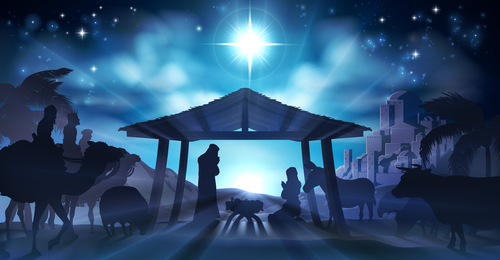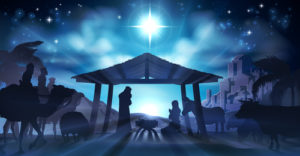
A brief history of Christmas Day

Image credit: Christos Georghiou/Shutterstock.com
Christmas is a time celebrated by Christians (and increasingly non-Christians) around the world. According to tradition, it’s a time when family and friends come together, indulge in feasting, give (especially to children) and receive presents, and generally have a good time.
However, the 25th December, Christmas Day, is one of the most important days of the year in the Christian calendar as it’s recognised as the ‘birth’ day of Jesus Christ. The term ‘Christmas’ is a derivation of the Mass of Christ (or Christ’s Mass), simply meaning a church service. It is where Christians specifically remember the life of Jesus, traditionally held late evening on the eve of his birthday. However, the actual birthday of Jesus has never been known – the date is never mentioned in the Bible! So, just how did 25th December become associated with Jesus’ birthday? And, how did the traditions of Christmas Day originate?
The Origin of Christmas Day
There has certainly been no consensus amongst Christians down the ages as to when Jesus’s birthday actually fell. Moreover, religious scholars agree that Jesus was probably born somewhere between 2 BC and 7 BC. There’s also a strong belief by many theologians that 25th December was the day chosen to celebrate Jesus’s birthday. This is because the Winter Solstice and the ancient pagan Roman festivals of ‘Saturnalia’ and ‘Dies Natalis Solis Invicti’ already took place around this time. So, as was common practice by early Christian missionaries, they simply chose an existing pagan festival to celebrate a Christian. The practice was in order to maximise conversions and merely substituted the meaning.
So, when was Jesus Born? The biblical reference to shepherds tending their flocks at night when they hear the news of Jesus’ birth suggests that it was lambing time – and hence, Spring! In the cold month of December, sheep were likely to have been penned up for the Winter. In fact, there was an acceptance amongst some early Christian followers that Jesus had been born on the 25th of March. This not only coincided with the accepted date of his death but also the date that they supposed the world came into being.
Circa 200 A.D., a Christian teacher in Egypt made the first known reference to the date Jesus was born. According to Clement of Alexandria, the 21st March, 15th, 20th, and 21st April, and 20th May were all days that different Christian factions considered was the birth date of Jesus. Surprising, 25th December, wasn’t mentioned at all.
Clearly, there was great uncertainty but considerable interest in establishing Jesus’ birth date by Christians. The first record of Christmas being celebrated on December 25th was in 336 A.D., at the end reign of the first Christian Roman Emperor, Constantine. By this time, the only other date widely recognized and celebrated as Jesus’ birthday was 6th January, as accepted by the Eastern Orthodox Church.
The Twelve Days of Christmas
The modern Armenian church continues to celebrate Christmas Day on 6th January. However, for most Christians 25th December prevailed as Jesus’ birthday. The 6th January eventually became known as the Feast of the Epiphany, commemorating the arrival of the three wise men (aka the Magi) in Bethlehem. The period between became the two dates eventually became known as the 12 days of Christmas.
An alternative theory to the selection of 25th December being chosen as Jesus’ birthday stems from the timing of the Jewish Festival of Lights, Hanukkah, which starts on the 25th of Kislev, the month in the Jewish calendar that coincides with December. Hanukkah celebrates the return of the Jewish people to their homeland and the right to practice their religion, after being exiled in Egypt (circa 1500 BC). It’s reasoned because Jesus and his early followers were originally Jewish, the early Church may have simply adopted 25th December as his birthday since it was already a day of a major celebration in the region.
The Start of Christmas Traditions
The Christmas traditions of holly, mistletoe, and even carols are thought by some to have originated from the pagan celebration of the Winter solstice. The Christmas tree came much later and has been linked with late medieval druidic practices. The first person to bring a Christmas Tree into a house, in the way we know it today, is thought by some to have been the 16th-century German preacher Martin Luther. The first Christmas Trees came to Britain sometime during the 1830s.
However, they became very popular in the country after 1841, when Prince Albert, the German husband of Queen Victoria, had a Christmas Tree set up in Windsor Castle. The custom of sending Christmas cards was started in the UK in 1843 by Sir Henry Cole. Initially, the price of cards and postage was prohibitive for ordinary people. However, as printing methods improved, costs fell, and Christmas cards became much more popular. They were produced mass-produced from around 1860 onwards and became even more popular still when postage charges fell markedly in 1870.
The practice of giving gifts at Christmas, according to Christian tradition, symbolises the giving of presents by the three wise men to the baby Jesus. The popularity of the custom in Britain grew in the mid 19th century after the publication of the popular poem ‘The Night Before Christmas’ by Clement Clarke Moore and the Dickens tale ‘A Christmas Carol’. By the end of the 19th century, Christmas Eve had replaced the previously popular times of early December and 6th January as the favoured time for gift-giving throughout Christendom.
Header image credit: Christos Georghiou/Shutterstock.com
If you’ve enjoyed reading this post, why not check out more of the articles in the series by clicking the following link: Why do we…….?





